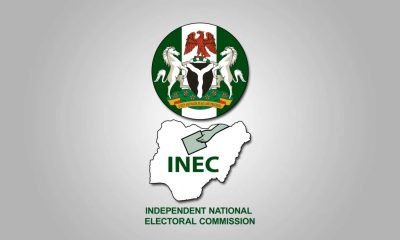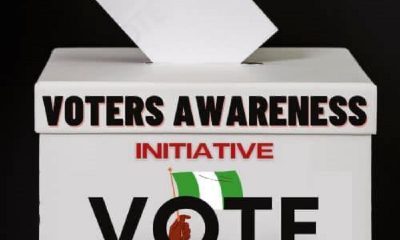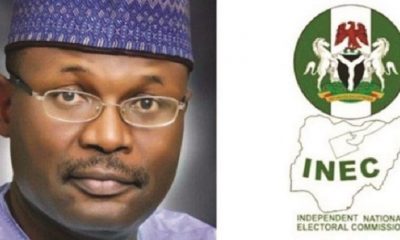Feature/OPED
Local Council Elections, INEC and State Governors

By Jerome-Mario Utomi
As a response to a recent intervention entitled Youths Quest For New Order; Still an Elusive Search, which among other things frowned at the youths inability to use the Saturday, December 5, 2020, legislative by-elections in the country, organised by the Independent National Electoral Commission (INEC) as an experimental subject (Guinea-Pig) to send political signals of the need for a generational change in leadership of the country come 2023, I got several reactions from esteemed readers.
While all contributions were well appreciated, one not only made a whole lot of sense but gave big helping hands to this piece.
It reads; Youths must first get their priorities right. Secondly, youths should partner with civil society to demand that local government elections must be conducted by INEC. That is the easiest way youths and oppositions can win elections, he concluded.
Apart from the fact that well foresighted Nigerians have in the past argued that to free local councils from the clutches of the state governors and ensure credible elections into local councils, the power to appoint chairpersons and commissioners of the state electoral bodies should be removed from the state governors, the global community, especially development-based groups and elections observers, do not think that what Nigeria is doing is the best way to organise elections be it at federal, states or local government levels as governments actions often fail to meet the four basic conditions necessary to create an enabling environment for holding of free and fair elections.
These conditions they noted include; an honest, competent and non-partisan body to administer the election, the knowledge and willingness of the political community to accept basic rules and regulations governing the contest for power, a developed system of political parties and teams of candidates presented to the electorates as alternative choices. And an independent judiciary to interpret electoral laws and settle election disputes.
Such worries partly explain the inertia and damning/reports that trails every election in the country monitored by international observers.
With the above highlighted, let us focus on major concerns that are local councils specific.
Local governments and elections say a recent report are two essential features of modern democracies. They help to establish, nurture and sustain democracy and democratic political culture. Elections provide the electorate with the power to freely participate in choosing their leaders and in providing the much-needed support and legitimacy to the state. Yet, its electoral approach/process has become curiously old fashioned and derogates the sanctity of elections as an institutional mechanism for conferring political power on citizens in a democratic dispensation.
This claim is supported by many facts.
In the accounts by Massoud Omar, Department of Local Government and Development Studies, Institute of Administration, Ahmadu Bello University, Zaria, Nigeria, credible elections into local government councils have been non-existent since independence in 960 till date. This is because the local councils are often subjected to controls by the upper levels of government in the federal system of government.
Adding that during the First Republic, the native authorities (as local governments were then called) were under the control of the regional governments. The constitution of the Second Republic (1979-1983) gave state governors the power to dissolve local councils and appoint caretaker committees to run the affairs of local councils.
‘The 1999 Constitution currently being operated empowers state governors to appoint chairpersons of State Independent Electoral Commissions (SIECs), the electoral umpires mandated to conduct local government elections in the 36 states of the federation.
As the situation stands, there is some ambiguity as to whether the state governors can dissolve local councils before elections are conducted at the expiration of their tenure, but often, state governors capitalise on this ambiguity to dissolve local councils at the end of their tenure and appoint caretaker committees. Often, these committees are staffed with cronies and party sympathisers’.
Anambra State is a vivid example of a state where caretaker committees took charge of local council affairs for about 10 years under four successive governors – Chris Ngige, Peter Obi, Andy Uba and Virginia Etiaba and again Peter Obi who towards the tell end of his administration organized election on January 11, 2014. Those elected have since vacated their positions since 2016. As at the time of filing this report, no local council elections have been held in the state since the dissolution under Governor Willy Obiano’s led administration.
Similarly, in most states where local government elections seem to have been held, there appears no remarkable difference between such a result and that of a one-party affair.
According to a commentator, it amounts to “selection” and “appointment” of local representatives because state governors use the incumbency factor to rig elections in favour of their preferred candidates.
Situations, where local councils are controlled by opposition parties, are rare and where this happens, the local councils are dissolved and caretaker committees, often made up of sympathizers of the ruling party are appointed in their place.
Even though, it cannot be characterized as an impossibility that a party at some points swept (wins) all the local council positions in a state, analysts are particularly worried about the frequency and disturbed by the accompanying believe that the main reason for this trend of affairs is that whoever controls the local councils is sure to gain control of the state government during gubernatorial elections.
Take as another illustration, the Abia State Independent Electoral Commission (ABSIEC), a few days ago (December 2020) declared the Peoples Democratic Party’s (PDP) 17 chairmanship candidates, the ruling party in the state, as winners in all the 17 local government council elections.
The same feat was achieved in Lagos state where the All Progressive Congress (APC) holds sway, Delta state in 2018 and chances are that the forthcoming local elections scheduled for March 6, 2021, in the state (ie Delta) may not be different. This particular attribute is not party-specific as it cuts across spectra of political parties in Nigeria.
To change this narrative as no nation can develop democratically under this arrangement; this is what the opinion article proposes.
First is the need to recognize that three electoral laws govern the process of electing people into political offices. They include the Constitution of the Federal Republic of Nigeria 1999, The Electoral Act 2010; and The INEC Regulations and Guidelines for the Conduct of Elections, 2019.
From the above, supervision of election- Section 78 of the Constitution provides that the registration of voters and the conduct of elections shall be subject to the direction and supervision of INEC.
Secondly, part one of the Electoral Act also provides that each state of the federation and Federal Capital Territory must establish an INEC office which shall perform functions that will be assigned to it from time to time by the commission and any person appointed to the office shall be answerable to the commission and will hold office for five years. This provision is made under Section 6 of the Act.
The Act also provides under Section 9 that the commission shall compile, maintain and update continuously a national register of voters for each state and the FCT and local government, which will include the names of all persons entitled to vote in any federal, state, local government or area council elections in Nigeria.
In the face of all these provisions/responsibilities performed by INEC at both state and local government levels, won’t it be considered as wisdom if the Electoral Act is again amended to allow/empower INEC handle local council elections in the country since they already exist in, and capped with the information/data of all the electorates in the 36 states/FCT and in all the 774 Local Government Areas in the country? The reason is predicated on the argument that in the past two decades of its existence; INEC may not have performed perfectly well.
However, if its performance is juxtaposed with experiences Nigerians have suffered in the hands of SIECs that of INEC will be adjudged a child’s play.
This piece hereby invites Nigerian youths to partner with civil society groups to think in this direction.
Jerome-Mario Utomi is the Programme Coordinator (Media and Public Policy), Social And Economic Justice Advocacy (SEJA), Lagos.
Feature/OPED
Brent’s Jump Collides with CBN Easing, Exposes Policy-lag Arbitrage

Nigeria is entering a timing-sensitive macro set-up as the oil complex reprices disruption risk and the US dollar firms. Brent moved violently this week, settling at $77.74 on 02 March, up 6.68% on the day, after trading as high as $82.37 before settling around $78.07 on 3 March. For Nigeria, the immediate hook is the overlap with domestic policy: the Central Bank of Nigeria (CBN) has just cut its Monetary Policy Rate (MPR) by 50 basis points to 26.50%, whilst headline inflation is still 15.10% year on year in January.
“Investors often talk about Nigeria as an oil story, but the market response is frequently a timing story,” said David Barrett, Chief Executive Officer, EBC Financial Group (UK) Ltd. “When the pass-through clock runs ahead of the policy clock, inflation risk, and United States Dollar (USD) demand can show up before any oil benefit is felt in day-to-day liquidity.”
Policy and Pricing Regime Shift: One Shock, Different Clocks
EBC Financial Group (“EBC”) frames Nigeria’s current set-up as “policy-lag arbitrage”: the same external energy shock can hit domestic costs, FX liquidity, and monetary transmission on different timelines. A risk premium that begins in crude can quickly show up in delivered costs through freight and insurance, and EBC notes that downstream pressure has been visible in refined markets, with jet fuel and diesel cash premiums hitting multi-year highs.
Market Impact: Oil Support is Conditional, Pass-through is Not
EBC points out that higher crude is not automatically supportive of the naira in the short run because “oil buffer” depends on how quickly external receipts translate into market-clearing USD liquidity. Recent price action illustrates the sensitivity: the naira was quoted at 1,344 per dollar on the official market on 19 February, compared with 1,357 a week earlier, whilst street trading was cited around 1,385.
At the same time, Nigeria’s inflation channel can move quickly even during disinflation: headline inflation eased to 15.10% in January from 15.15% in December, and food inflation slowed to 8.89% from 10.84%, but energy-led transport and logistics costs can reintroduce pressure if the risk premium persists. EBC also points to a broader Nigeria-specific reality: the economy grew 4.07% year on year in 4Q25, with the oil sector expanding 6.79% and non-oil 3.99%, whilst average daily oil production slipped to 1.58 million bpd from 1.64 million bpd in 3Q25. That mix supports external-balance potential, but it also underscores why the domestic liquidity benefit can arrive with a lag.
Nigeria’s Buffer Looks Stronger, but It Does Not Eliminate Sequencing Risk
EBC sees that near-term external resilience is improving. The CBN Governor said gross external reserves rose to USD 50.45 billion as of 16 February 2026, equivalent to 9.68 months of import cover for goods and services. Even so, EBC views the market’s focus as pragmatic: in a risk-off tape, investors tend to price the order of transmission, not the eventual balance-of-payments benefit.
In the near term, EBC expects attention to rotate to scheduled energy and policy signposts that can confirm whether the current repricing is a short, violent adjustment or a more durable regime shift, including the U.S. Energy Information Administration (EIA) Short-Term Energy Outlook (10 March 2026), OPEC’s Monthly Oil Market Report (11 March 2026), and the U.S. Federal Reserve meeting (17 to 18 March 2026). On the domestic calendar, the CBN’s published schedule points to the next Monetary Policy Committee meeting on 19 to 20 May 2026.
Risk Frame: The Market Prices the Lag, Not the Headline
EBC cautions that outcomes are asymmetric. A rapid de-escalation could compress the crude risk premium quickly, but once freight, insurance, and hedging behaviour adjust, second-round effects can linger through inflation uncertainty and a more persistent USD bid.
“Oil can act as a shock absorber for Nigeria, but only when the liquidity channel is working,” Barrett added. “If USD conditions tighten first and domestic pass-through accelerates, the market prices the lag, not the headline oil price.”
Brent remains an anchor instrument for tracking this timing risk because it links energy-led inflation expectations, USD liquidity, and emerging-market risk appetite in one market. EBC Commodities offering provides access to Brent Crude Spot (XBRUSD) via its trading platform for following energy-driven macro volatility through a single instrument.
Feature/OPED
Gen Alpha: Africa’s Digital Architects, Not Your Target Audience

By Emma Kendrick Cox
This year, the eldest Gen Alpha turns 16.
That means they aren’t just the future of our work anymore. They are officially calling for a seat at the table, and they’ve brought their own chairs. And if you’re still calling this generation born between 2010 and 2025 the iPad generation, then I hate to break it to you, but you’re already obsolete. To the uninitiated, they look like a screen-addicted mystery. To those of us paying attention, they are the most sophisticated, commercially potent, and culturally fluent architects Africa has ever seen.
Why? Because Alphas were not born alongside the internet. They were born inside it. And by 2030, Africa will be home to one in every three Gen Alphas on the planet.
QWERTY the Dinosaur
We are witnessing the rise of a generation that writes via Siri and speech-to-text before they can even hold a pencil. With 63% of these kids navigating smartphones by age five, they don’t see a QWERTY keyboard as a tool. They see it as a speed bump, the long route, an inefficient use of their bandwidth. They don’t need to learn how to use tech because they were born with the ability to command their entire environment with a voice note or a swipe.
They are platform agnostic by instinct. They don’t see boundaries between devices. They’ll migrate from an Android phone to a Smart TV to an iPhone without breaking their stride. To them, the hardware is invisible…it’s the experience that matters.
They recognise brand identities long before they know the alphabet. I share a home with a peak Gen Alpha, age six and a half (don’t I dare forget that half). When she hears the ding-ding-ding-ding-ding of South Africa’s largest bank, Capitec’s POS machine, she calls it out instantly: “Mum! Someone just paid with Capitec!” It suddenly gives a whole new meaning to the theory of brand recall, in a case like this, extending it into a mental map of the financial world drawn long before Grade 2.
And it ultimately lands on this: This generation doesn’t want to just view your brand from behind a glass screen. They want to touch it, hear it, inhabit it, and remix it. If they can’t live inside your world, you’re literally just static.
The Uno Reverse card
Unlike any generation we’ve seen to date, households from Lagos to Joburg and beyond now see Alphas hold the ultimate Uno Reverse card on purchasing power. With 80% of parents admitting their kids dictate what the family buys, these Alphas are the unofficial CTOs and Procurement Officers of the home:
-
The hardware veto: Parents pay the bill, but Alphas pick the ISP based on Roblox latency and YouTube 4K buffers.
-
The Urban/Rural bridge: In the cities, they’re barking orders at Alexa. In rural areas, they are the ones translating tech for their families and narrowing the digital divide from the inside out.
-
The death of passive: I’ll fall on my sword when I say that with this generation, the word consumer is dead. It implies they just sit there and take what you give them, when, on the contrary, it is the total opposite. Alphas are Architectural. They are not going to buy your product unless they can co-author the experience from end to end.
As this generation creeps closer and closer to our bullseye, the team here at Irvine Partners has stopped looking at Gen Alpha as a demographic and started seeing them as the new infrastructure of the African market. They are mega-precise, fast, and surgically informed.
Believe me when I say they’ve already moved into your industry and started knocking down the walls. The only question is: are you building something they actually want to live in, or are you just a FaceTime call they are about to decline?
Pay attention. Big moves are coming. The architects are here.
Emma Kendrick Cox is an Executive Creative Director at Irvine Partners
Feature/OPED
Why Digital Trust Matters: Secure, Responsible AI for African SMEs?

By Kehinde Ogundare
For years, security for SMEs across sub-Saharan Africa meant metal grilles and alarm systems. Today, the most significant risks are invisible and growing faster than most businesses realise.
Artificial Intelligence has quietly embedded itself into everyday operations. The chatbot responding to customers at midnight, the system forecasting inventory requirements, and the software identifying unusual transactions are no longer experimental technologies. They are becoming standard features of modern business tools.
Last month’s observance of Safer Internet Day on February 10, themed ‘Smart tech, safe choices’, marked a pivotal moment. As AI adoption accelerates, the conversation must shift from whether businesses should use AI to how they deploy it responsibly. For SMEs across Africa, digital trust is no longer a technical consideration. It is a strategic business imperative.
The evolving threat landscape
Cybersecurity threats facing sub-Saharan African SMEs have moved well beyond basic phishing emails. Globally, cybercrime costs are projected to reach $10.5 trillion this year, fuelled by generative AI and increasingly sophisticated social engineering techniques. Ransomware attacks now paralyse entire operations, while other threats quietly extract sensitive customer data over extended periods.
The regional impact is equally significant. More than 70% of South African SMEs report experiencing at least one attempted cyberattack, and Nigeria faces an average of 3,759 cyberattacks per week on its businesses. Kenya recorded 2.54 billion cyber threat incidents in the first quarter of 2025 alone, whilst Africa loses approximately 10% of its GDP to cyberattacks annually.
The hidden risk of fragmentation
A common but often overlooked vulnerability lies in digital fragmentation.
In the early stages of growth, SMEs understandably prioritise affordability and agility. Over time, this can result in a patchwork of disconnected applications, each with separate logins, security standards, and privacy policies. What begins as flexibility can involve operational complexity.
According to IBM Security’s Cost of a Data Breach Report, companies with highly fragmented security environments experienced average breach costs of $4.88 million in 2024.
Fragmented systems create blind spots; each additional data transfer between applications increases exposure. Inconsistent security protocols make governance harder to enforce. Limited visibility reduces the ability to detect anomalies early. In practical terms, complexity increases risk.
Privacy-first AI as a competitive differentiator
As AI capabilities become embedded in business software, SMEs face a choice about how they approach these powerful tools. The risks are not merely theoretical.
Consumers across Africa are becoming more aware of data rights and are willing to walk away from businesses that cannot demonstrate trustworthiness. According to KPMG’s Trust in AI report, approximately 70% of adults do not trust companies to use AI responsibly, and 81% expect misuse. Meanwhile, studies also show that 71% of consumers would stop doing business with a company that mishandles information.
Trust, once lost, is difficult to rebuild. In the digital age, a single data leak can destroy a reputation that took ten years to build. When customers share their payment details or purchase history, they extend trust. How you handle that trust, particularly when AI processes their data, determines whether they return or take their business elsewhere.
Privacy-first, responsible AI design means building intelligence into business systems with data protection, transparency and ethical use embedded from the outset. It involves collecting only necessary information, storing it securely, being transparent about how AI makes decisions, and ensuring algorithms work without compromising customer privacy. For SMEs, this might mean choosing inventory software where predictive AI runs on your own data without sending it externally, or customer service platforms that analyse patterns without exposing individual records. When AI is built responsibly into unified platforms, it becomes a competitive advantage: you gain operational efficiency whilst demonstrating that customer data is protected, not exploited.
Unified platforms and operational resilience
The solution lies in rethinking digital infrastructure. Rather than accumulating disparate tools, businesses need unified platforms that integrate core functions whilst maintaining consistent security protocols.
A unified approach means choosing cloud-based platforms where functions share common security standards, and data flows seamlessly. For a manufacturing SME, this means inventory management, order processing and financial reporting operate within a single security framework.
When everything operates cohesively, security gaps diminish, and the attack surface shrinks. And the benefits extend beyond risk reduction: employees spend less time on administrative friction, customer data stays consistent, and platforms enable secure collaboration without traditional infrastructure costs.
Safer Internet Day reminds us that the digital world requires active stewardship. For SMEs across the African continent who are navigating complex threats whilst harnessing AI’s potential, digital trust is foundational to sustainable growth. Security, privacy and responsible AI are essential characteristics of any technology infrastructure worth building upon. Businesses that embrace unified, privacy-first platforms will be more resilient against cyber threats and better positioned to earn and maintain trust. In a market where trust is currency, that advantage is everything.
Kehinde Ogundare is the Country Head for Zoho Nigeria
-

 Feature/OPED6 years ago
Feature/OPED6 years agoDavos was Different this year
-
Travel/Tourism10 years ago
Lagos Seals Western Lodge Hotel In Ikorodu
-

 Showbiz3 years ago
Showbiz3 years agoEstranged Lover Releases Videos of Empress Njamah Bathing
-

 Banking8 years ago
Banking8 years agoSort Codes of GTBank Branches in Nigeria
-

 Economy3 years ago
Economy3 years agoSubsidy Removal: CNG at N130 Per Litre Cheaper Than Petrol—IPMAN
-

 Banking3 years ago
Banking3 years agoSort Codes of UBA Branches in Nigeria
-

 Banking3 years ago
Banking3 years agoFirst Bank Announces Planned Downtime
-

 Sports3 years ago
Sports3 years agoHighest Paid Nigerian Footballer – How Much Do Nigerian Footballers Earn





















